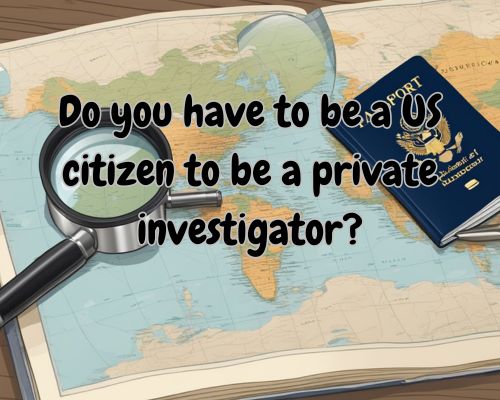Do You Have to Be a US Citizen to Be a Private Investigator? Essential Requirements ExplainedDo You Have to Be a US Citizen to Be a Private Investigator? Essential Requirements Explained
Becoming a private investigator like Ali Private Investigator Tampa, in the U.S. is an appealing career path for many. It offers the opportunity to put investigative skills to work in uncovering hidden truths.
One of the most burning questions for prospective P.I.s is whether U.S. citizenship is a requirement for entering the profession. In most states, you do not need to be a U.S. citizen to become a private investigator, but you must legally reside and work in the U.S.

The requirements to become a private investigator can vary significantly state by state. While formal education may not always be necessary, having a background in law enforcement or the military can provide invaluable experience.
Skills such as problem-solving, detailed research, and keen observation are essential. These make this profession both challenging and rewarding.
Understanding the specific licensing requirements in your state is crucial. Some states may require certain certifications or background checks. Others may have age or experience requirements, particularly in investigative work or related fields.
Exploring these details will help you navigate the path to becoming a successful private investigator in the U.S.
Eligibility and Licensure Requirements
Understanding the requirements to become a private investigator is crucial. These requirements often involve legal status, education, experience, and meeting state-specific criteria.
Citizenship and Legal Status
To become a private investigator in many states, you often need to be a U.S. citizen or legal resident. Citizenship requirements vary by state, so you must check the specific requirements where you intend to practice.
Legal status is crucial, and you will likely undergo a background check to ensure you meet these criteria without any disqualifying criminal history. Note that felony convictions can be a significant barrier.
Educational and Training Background
A high school diploma or GED is typically the minimum educational requirement. Some states or employers may prefer candidates with college degrees in criminal justice, law enforcement, or a related field.
Training in investigative techniques, surveillance, and research is beneficial. Institutions often offer specialized training programs that can enhance your skills and qualifications.
Experience and Specialized Skills
Experience in related fields such as law enforcement, military, or as a police officer can be invaluable.
Skills in conducting interviews, performing surveillance, and gathering information efficiently are crucial.
Specialized skills such as digital forensics, financial investigations, and understanding legal procedures can set you apart.
Many agencies value practical experience over formal education, so hands-on skills are highly regarded.
State-Specific Licensing Requirements
Licensing requirements vary significantly between states. You generally need to pass an exam, undergo a background check, and submit an application with the relevant licensing department, often the Department of Public Safety.
Some states require aspiring private investigators to have a business license as well. Completing state-mandated training or education programs is often necessary to obtain your private investigator license.
Career Path and Opportunities
As a private investigator, your career path can vary based on roles, sectors, advancement opportunities, and the necessary education requirements. Understanding the nature of these factors will help you plan your path in the investigative field. Let us understand these with Ali Private Investigator Tampa.
Roles and Responsibilities
Private investigators typically engage in a variety of tasks such as surveillance, collecting evidence, and preparing investigative reports.
You might work on cases involving infidelity, fraud, or missing persons.
Your tasks can range from conducting interviews and gathering information to performing background checks and providing detailed reports to clients.
Proficiency in using technology, such as GPS tracking and computer databases, enhances your ability to handle these responsibilities effectively. Certificates in specialized areas can bolster your expertise and marketability.
Employment Sectors and Clientele
Private investigators can find jobs in multiple sectors, including law firms, insurance companies, and corporate organizations.
An investigator might also work for government agencies or independently.
Clients could be individuals seeking details on personal matters or businesses in need of internal investigations.
Private detectives often cater to attorneys, corporate executives, and individuals. Your ability to adapt to varying client needs can determine your success and growth in this field. Cultivating a diverse clientele base can lead to steady demand for your services.
Advancement and Continuing Education
Advancing in a private investigation career often involves obtaining additional certifications and participating in continuous education.
Specialized training programs can cover areas like computer forensics, fraud, and cybercrime. This further education helps in staying updated with the evolving methodologies and technologies in the investigative domain.
Networking through professional organizations and attending industry conferences can also aid in career progression.
As you gain experience and additional skills, you can move into higher-paid or more complex investigative roles.

